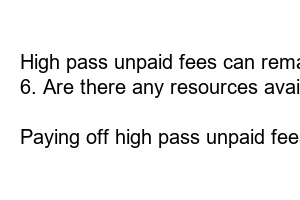하이패스 미납요금 납부방법
Title: How to Successfully Clear High Pass Unpaid Fees
Introduction:
Have you found yourself burdened with high pass unpaid fees? Dealing with such financial obligations can be overwhelming, but fret not! In this blog post, we will guide you through the process of paying off these fees efficiently and effectively. With our helpful tips and insights, you’ll be on your way to financial freedom in no time.
1. Understanding High Pass Unpaid Fees:
Before delving into the steps you need to take to settle high pass unpaid fees, it’s essential to comprehend what they are. These fees are introduced by high pass service providers as penalties for late or missed payments.
2. Assessing the Situation:
To tackle high pass unpaid fees, it is crucial to evaluate your financial standing. Determine the total amount owed, including any additional charges or interest. This assessment will give you a clear picture of the debt you need to repay.
3. Negotiating a Repayment Plan:
If paying the entire amount upfront seems unmanageable, don’t panic. Many high pass service providers offer repayment plan options. You can contact their customer service and discuss a suitable payment arrangement that fits your financial capabilities.
4. Prioritizing the Debt:
If you have multiple unpaid fees, prioritize paying off the most urgent ones first. Identify fees that have the highest interest rates or those that have already incurred additional penalties. Allocating your resources wisely will help you clear the debt systematically.
5. Cutting Back on Expenses:
To speed up the process of paying off high pass unpaid fees, it may be beneficial to cut back on unnecessary expenses temporarily. Analyze your monthly budget and identify areas where you can reduce spending. This exercise will allow you to free up more funds to allocate towards fee repayment.
6. Seeking Financial Assistance:
In cases where the accumulated fees are simply too overwhelming, consider reaching out to financial assistance programs or seeking professional advice. Organizations or individuals dealing with debt management may be able to provide guidance and support to navigate through your financial difficulties.
FAQs:
1. Can high pass unpaid fees affect my credit score?
Yes, unpaid fees can negatively impact your credit score if they are reported to credit bureaus.
2. What happens if I ignore these unpaid fees?
Ignoring unpaid fees can lead to further penalties, legal actions, or even suspension of services from the high pass provider.
3. Can I make partial payments to settle the fees?
In most cases, partial payments are accepted, especially if you communicate with your high pass service provider and agree on a repayment plan.
4. Will paying off the unpaid fees remove them from my record?
Once the fees are paid in full, they should no longer be considered delinquent. However, they may still appear on your payment history.
5. How long do high pass unpaid fees stay on the record?
High pass unpaid fees can remain on your record for several years, affecting your creditworthiness.
6. Are there any resources available to help me understand my rights as a consumer?
Various consumer protection agencies can help you understand your rights and assist in resolving any issues related to high pass unpaid fees.
Summary:
Paying off high pass unpaid fees may appear daunting, but with proper evaluation, negotiation, and financial discipline, you can overcome this challenge. By following the steps outlined above and seeking assistance when necessary, you’ll be on track to clear your debts and regain control over your finances. Remember, addressing your priorities, cutting back on expenses, and managing your finances efficiently are key elements in successfully repaying high pass unpaid fees.

